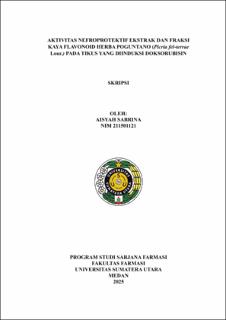| dc.description.abstract | Background: The kidneys are vital organs that are susceptible to damage from nephrotoxic agents, including anticancer drugs such as doxorubicin. Although effective in the management of diverse tumor types, it is well known that doxorubicin can harm kidneys by producing reactive oxygen species (ROS). Poguntano's antioxidant flavonoid content makes it a promising candidate for nephroprotective development.
Objective: To determine the effect of flavonoid-rich extract or fraction of poguntano herb (Picria fel-terrae Lour.) as nephroprotective in doxorubicin-induced male rats.
Methods: The preparation of crude medications and ethanol extracts of Poguntano herb using the reflux method with 70% ethanol solvent, characterization of the crude medications and extracts, phytochemical screening, fractionation, total flavonoid content determination, and in vivo testing are all included in this experimental study. The experimental mice were split up into six groups: treatment groups with Poguntano extract or fractions at doses of 50, 100, 200, and 400 mg/kg BW; negative control (CMC-Na 0.5%); and positive control (quercetin 50 mg/kg BW). For nine days, the medication was taken orally. On days 8 and 9, doxorubicin was injected intraperitoneally at a dose of 10 mg/kg BW. Blood was drawn from the mice's hearts on day 10 for urea, creatinine, and histopathological examination.
Results: FSHP had the highest total flavonoid content (65.011 mgQE/g), according to the data, followed by the n-hexane fraction, ethanol extract, and ethyl acetate fraction. In comparison to the negative control, creatinine and urea levels were decreased by doses of 100, 200, and 400 mg/kg body weight; the positive control showed the lowest levels (0.81 and 48.8 mg/dl). The negative control displayed glomerular atrophy, whereas the positive control's renal histology seemed normal.
Conclusion: The residual fraction of poguntano herb has nephroprotective activity against doxorubicin-induced rats. | en_US |


